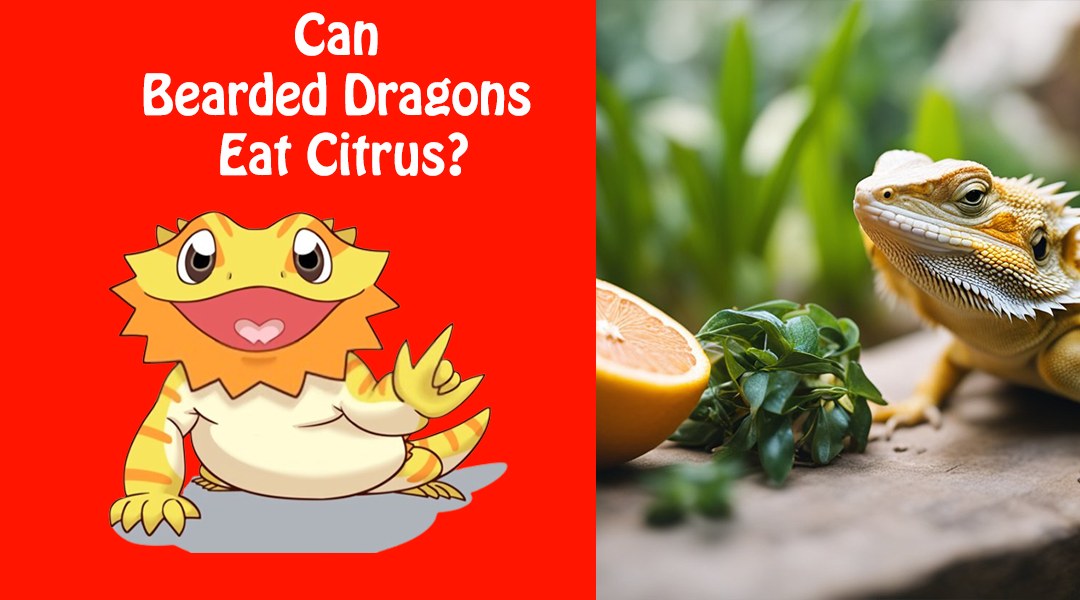Bearded dragons are popular pets due to their docile nature and unique appearance. As with any pet, it is important to ensure that they are being fed a balanced and appropriate diet. One question that often arises is whether bearded dragons can eat citrus fruits such as oranges and lemons.
While bearded dragons are omnivores and can eat a variety of fruits and vegetables, citrus fruits should be avoided. Citrus fruits contain high levels of citric acid, which can cause digestive issues and even lead to calcium deficiencies in bearded dragons. As bearded dragons require calcium for strong bones and overall health, it is important to avoid any foods that can interfere with their calcium absorption. In this article, we will explore the reasons why citrus fruits are not a suitable food for bearded dragons and provide alternative options for a healthy and balanced diet.
Bearded Dragons Dietary Basics
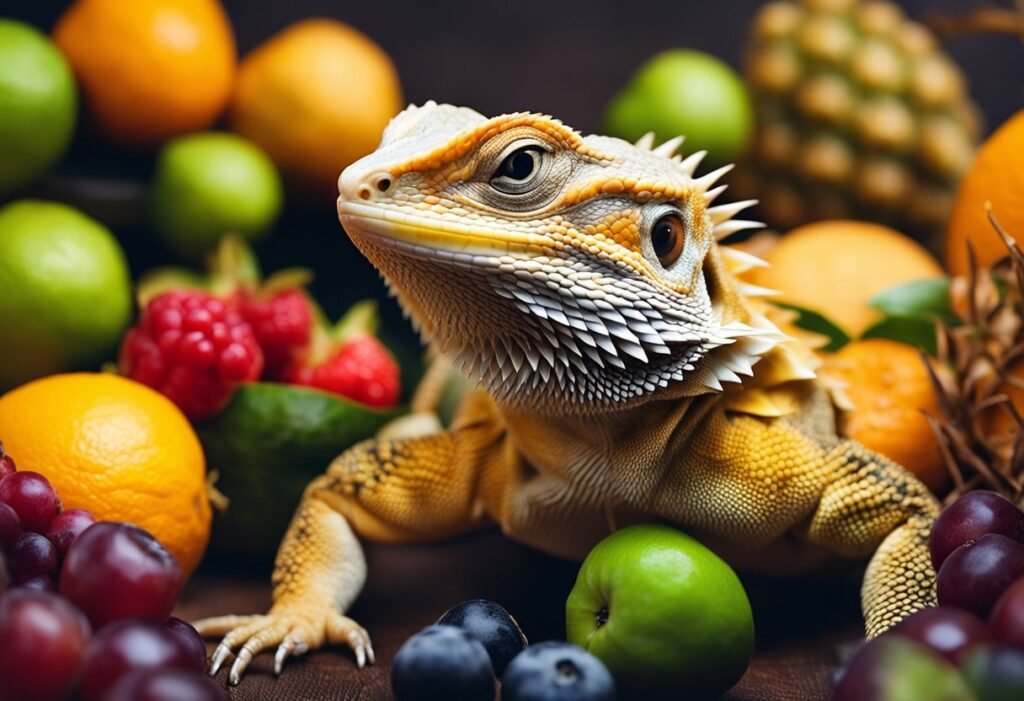
Nutritional Needs
As a responsible pet owner, it is important to provide your bearded dragon with a well-balanced diet to ensure their overall health and well-being. Bearded dragons are omnivores, which means they eat both animal and plant-based foods. Their diet should consist of a variety of fresh vegetables, fruits, and insects.
Vegetables such as collard greens, kale, and mustard greens are excellent sources of calcium, which is essential for the development and maintenance of strong bones. Other vegetables such as carrots, squash, and sweet potato provide your bearded dragon with essential vitamins and minerals.
Fruits such as strawberries, blueberries, and raspberries are great sources of antioxidants and vitamin C, which helps boost the immune system. However, it is important to note that fruits should only be given in moderation due to their high sugar content.
Insects such as crickets, mealworms, and dubia roaches are excellent sources of protein and should make up a significant portion of your bearded dragon’s diet. It is important to gut-load insects before feeding them to your bearded dragon to ensure they receive all the necessary nutrients.
Risks of Improper Diet
Feeding your bearded dragon an improper diet can lead to various health issues such as metabolic bone disease, obesity, and digestive problems. A diet that is high in fat and low in nutrients can lead to obesity, while a diet that is low in calcium can lead to metabolic bone disease.
Feeding your bearded dragon foods that are high in oxalates such as spinach, parsley, and beet greens can lead to the formation of kidney stones. Citrus fruits such as oranges and lemons should also be avoided as they are acidic and can cause digestive problems.
In conclusion, providing your bearded dragon with a well-balanced diet consisting of fresh vegetables, fruits, and insects is essential for their overall health and well-being. Avoid feeding them foods that are high in fat, low in nutrients, or contain high levels of oxalates or acid.
Citrus Fruits and Reptiles
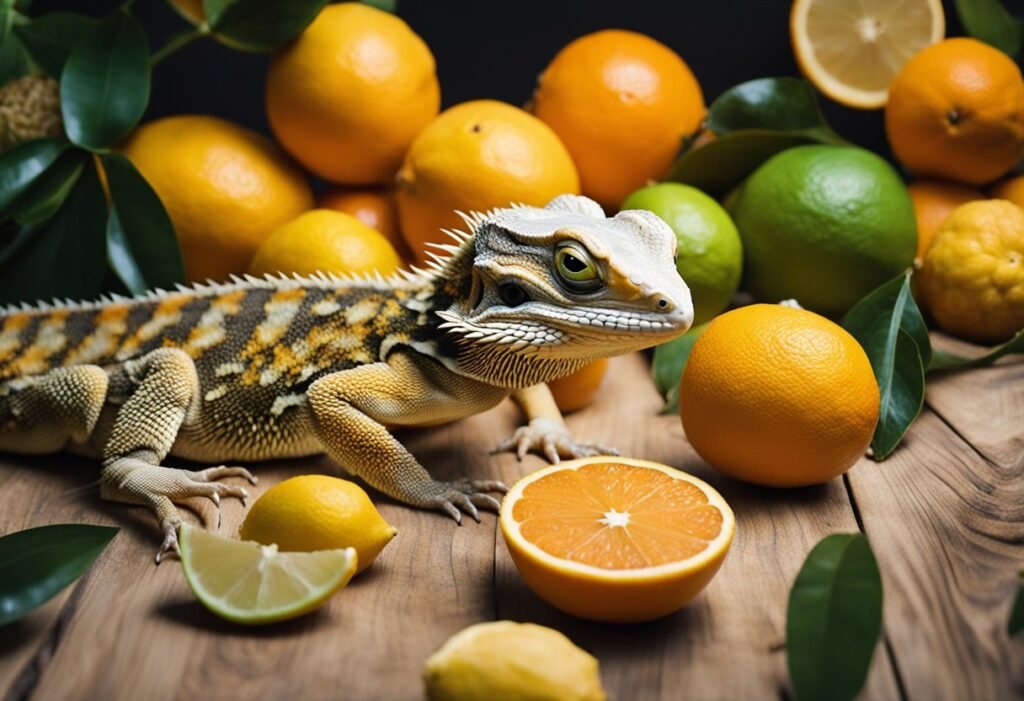
Citrus fruits are a common part of human diets and are known for their high vitamin C content. However, when it comes to feeding citrus fruits to reptiles, such as bearded dragons, there are some important things to consider.
Acidity and Sugar Content
Citrus fruits are known for their high acidity and sugar content. While this may be beneficial for humans, it can be harmful to reptiles. Bearded dragons have a delicate digestive system, and feeding them citrus fruits can upset their stomach and cause diarrhea. Additionally, the high sugar content can lead to obesity and other health issues.
Potential Health Concerns
Feeding bearded dragons citrus fruits can also lead to other health concerns. Citrus fruits contain compounds called psoralens, which can cause skin irritation and even burns when exposed to sunlight. This can be especially problematic for reptiles that require UVB lighting to stay healthy.
Moreover, citrus fruits contain a high amount of oxalates, which can bind to calcium and prevent its absorption. This can lead to metabolic bone disease, a common health issue in reptiles.
In conclusion, while citrus fruits may be beneficial for humans, they are not a suitable food for bearded dragons and other reptiles. It is important to provide a well-balanced diet that includes a variety of vegetables, fruits, and insects to ensure the health and well-being of your pet.
Feeding Bearded Dragons Citrus
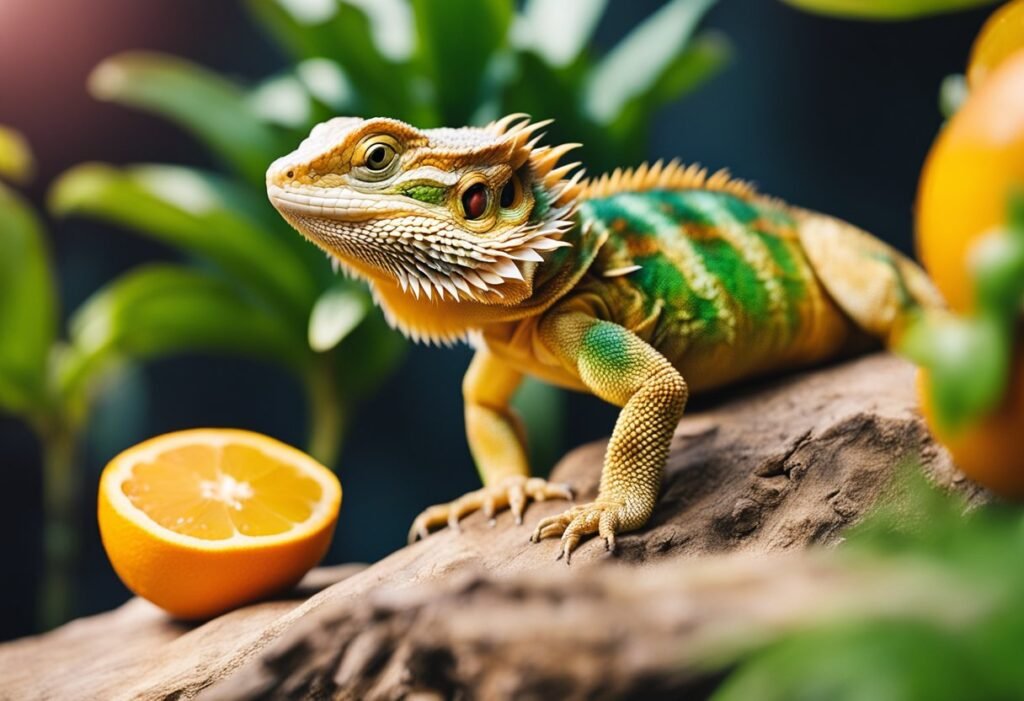
Citrus fruits such as oranges, lemons, and grapefruits are known for their high vitamin C content and tangy taste. However, when it comes to feeding bearded dragons, citrus fruits should be avoided due to their high acidity levels. In this section, we will discuss the frequency and serving size of citrus fruits for bearded dragons, as well as safe citrus alternatives.
Frequency and Serving Size
Bearded dragons require a balanced diet that consists of vegetables, fruits, and insects. While citrus fruits are not toxic to bearded dragons, they should be fed in moderation. We recommend feeding citrus fruits as an occasional treat, no more than once a month.
When feeding citrus fruits to your bearded dragon, it is important to consider the serving size. A small slice of citrus fruit is enough for a bearded dragon, and the fruit should be cut into small pieces to prevent choking. It is also important to remove any seeds or pits from the fruit before feeding it to your bearded dragon.
Safe Citrus Alternatives
If you are looking for safe alternatives to citrus fruits, there are many options available. Bearded dragons can safely eat fruits such as apples, bananas, and berries, which are low in acidity and high in vitamins and minerals. Vegetables such as carrots, squash, and leafy greens are also great options for a balanced diet.
In conclusion, while citrus fruits can be a tasty treat for bearded dragons, they should be fed in moderation due to their high acidity levels. It is important to consider the serving size and frequency of citrus fruits, and to always provide safe alternatives for a balanced diet.
Preparing Citrus for Bearded Dragons
When it comes to feeding citrus fruits to bearded dragons, it is important to ensure that they are prepared properly. Here are some tips on how to prepare citrus for your bearded dragon.
Peeling and Chopping
Firstly, we recommend that you peel the citrus fruit before feeding it to your bearded dragon. This is because the skin of the fruit can be tough and difficult for them to digest. Once peeled, you can chop the fruit into small, bite-sized pieces that are easier for your bearded dragon to eat.
It is important to note that some bearded dragons may struggle to eat larger pieces of citrus fruit, so it may be necessary to chop it into smaller pieces or even puree it.
Observing Reactions
Before feeding citrus fruit to your bearded dragon, it is important to observe their reactions to it. Some bearded dragons may be allergic to citrus, which can cause them to have an adverse reaction. Signs of an allergic reaction can include swelling, difficulty breathing, and lethargy.
If your bearded dragon shows any signs of an allergic reaction, it is important to stop feeding them citrus immediately and seek veterinary attention.
In conclusion, citrus can be a nutritious addition to your bearded dragon’s diet, but it is important to prepare it properly and observe their reactions to it. By following these tips, you can ensure that your bearded dragon stays healthy and happy.
Signs of Dietary Issues in Bearded Dragons
As responsible pet owners, we want to ensure that our bearded dragons are healthy and happy. One way we can do this is by monitoring their diet and being aware of any signs of dietary issues. Here are some signs to look out for:
Recognizing Adverse Reactions
If your bearded dragon is experiencing an adverse reaction to their food, you may notice the following symptoms:
- Lethargy or lack of energy
- Loss of appetite
- Diarrhea or constipation
- Vomiting
- Abnormal behavior, such as aggression or hiding
These symptoms can be caused by a variety of factors, including improper diet, food allergies, or digestive issues. It’s important to pay attention to your bearded dragon’s behavior and seek veterinary care if you notice any of these symptoms.
When to Consult a Vet
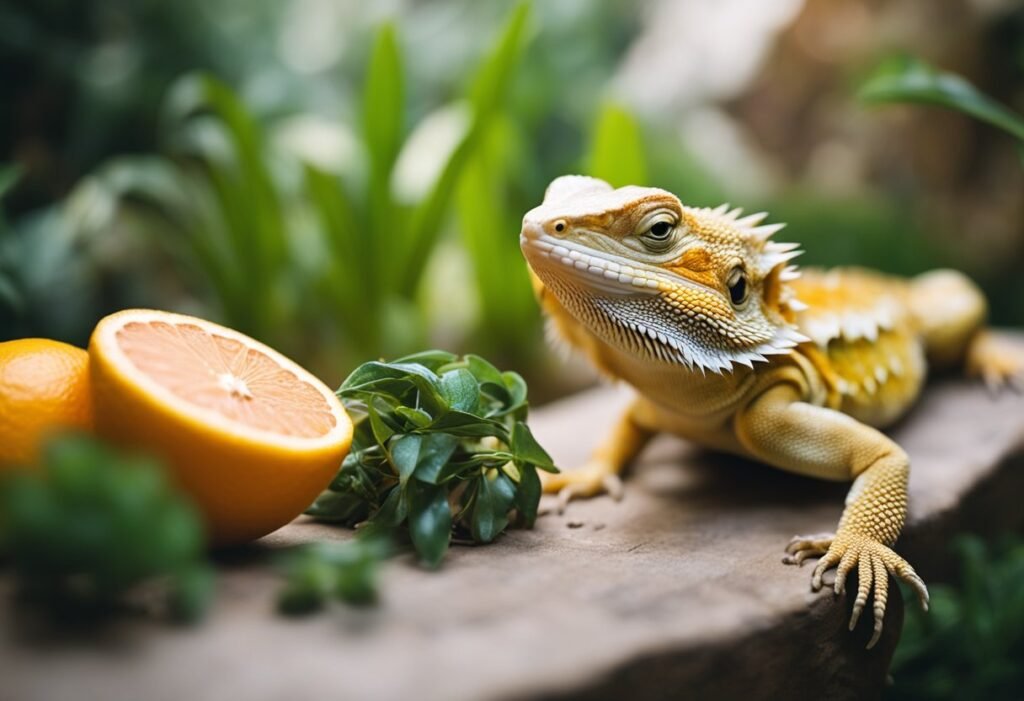
If you notice any of the above symptoms or suspect that your bearded dragon is experiencing dietary issues, it’s important to consult a veterinarian who specializes in reptiles. They can help you identify the underlying cause of the problem and provide appropriate treatment.
In addition to seeking veterinary care, you can help prevent dietary issues by providing a balanced diet that meets your bearded dragon’s nutritional needs. Avoid feeding your bearded dragon foods that are high in oxalates, such as spinach and rhubarb, as these can interfere with calcium absorption and lead to health problems.
By being aware of the signs of dietary issues and taking proactive steps to prevent them, we can help ensure that our bearded dragons live long, healthy lives.
Frequently Asked Questions
What types of fruit are safe for bearded dragons to consume daily?
Bearded dragons can consume a variety of fruits on a daily basis, including apples, blueberries, raspberries, and mangoes. However, it is important to feed them in moderation, as fruits are high in sugar content.
Which vegetables are recommended for daily intake by bearded dragons?
Bearded dragons should consume a variety of vegetables on a daily basis, including collard greens, mustard greens, kale, and dandelion greens. Vegetables provide essential vitamins and minerals to keep your bearded dragon healthy.
Are there any fruits that could be harmful to bearded dragons?
Yes, there are some fruits that could be harmful to bearded dragons. Citrus fruits such as oranges, lemons, and grapefruits are high in acid content and can cause digestive issues. Avocado is also harmful to bearded dragons, as it contains a toxin that can be fatal to them.
Can bearded dragons have apples as part of their diet?
Yes, bearded dragons can have apples as part of their diet. Apples are a good source of vitamins and minerals, but they should be fed in moderation due to their high sugar content.
Is it safe for bearded dragons to eat pineapple?
Pineapple is safe for bearded dragons to eat, but it should be fed in moderation. Pineapple contains high levels of sugar and acid, which can cause digestive issues if consumed in large amounts.
Are strawberries a suitable fruit option for bearded dragons?
Yes, strawberries are a suitable fruit option for bearded dragons. They are low in sugar and high in vitamin C, which makes them a healthy snack option. However, they should be fed in moderation, as too much can cause diarrhea.

I, Mark Antonelli am highly interested in pet care tips. The experiences I gained through university life in animal sciences were also helpful to identify the best tricks for caring for and feeding varying kinds of pets. I know the majority of people love to own a pet. Yet, there is a guilty of owing a Bearded Dragon due to a lack of information about how much friendly and peaceful they are. I thought of filling this gap with detailed writings about this Pogona genus Bearded Dragon. All my team is also giving me great support to fulfil my mission. Hope you will enjoy the journey with us.

